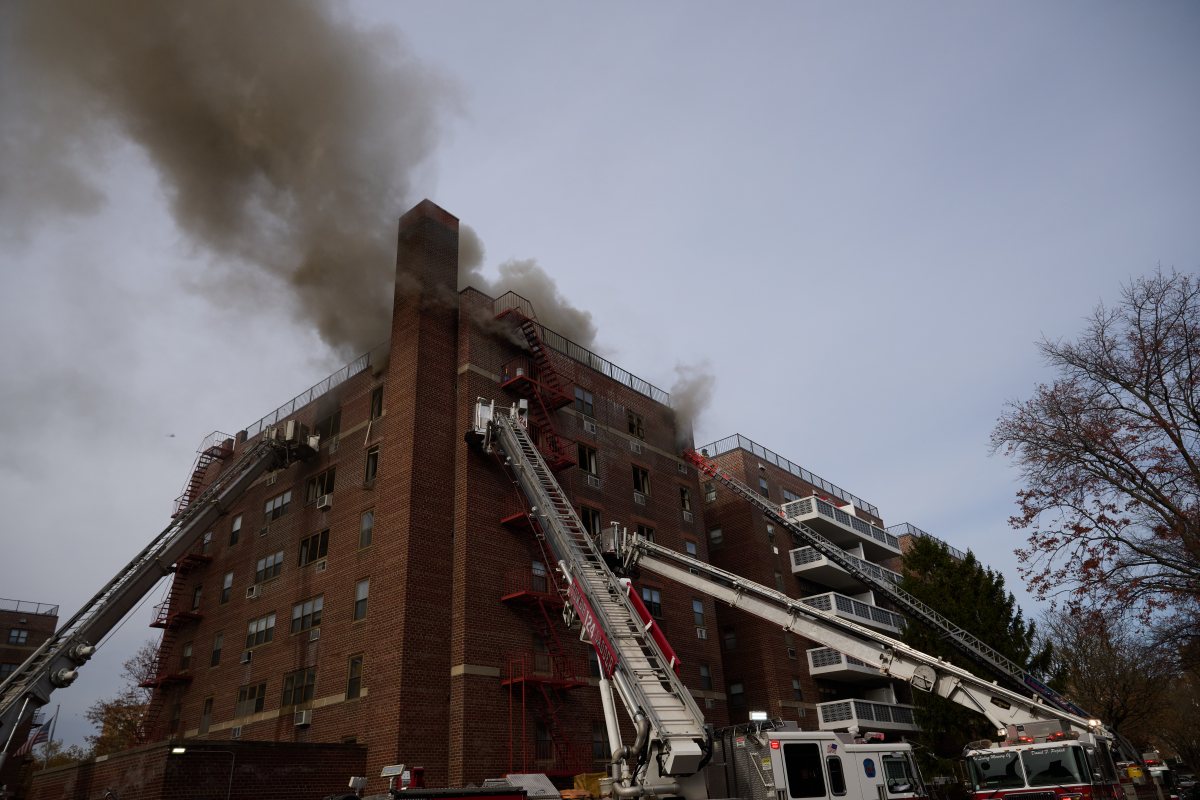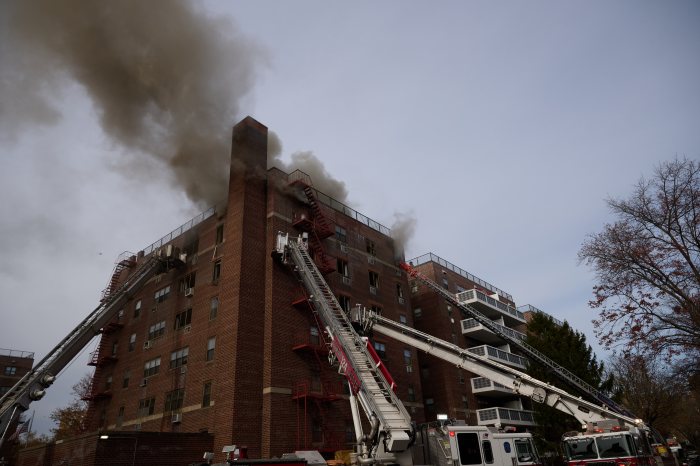By Lincoln Anderson
Drawing a packed crowd to St. Mark’s Bookshop last Thursday evening thanks to Twitter and a shout-out by Amy Goodman on WBAI, filmmaker Michael Moore called on landlord Cooper Union to cut the financially strapped store a break.
Before doing a signing for his new book, “Here Comes Trouble,” he voiced his strong support for the embattled store — and his deep love for bookstores in general. The school is obligated to give the store a rent reduction, he said.
“We’re appealing to Cooper Union, and we’re appealing politely,” said Moore. “We must appeal to their conscience and the integrity of their history. They exist because of the support of the people of New York.”
The famously leftist documentarian laced his speech with criticisms of Wall St. greed and the subprime mortgage scam that have plunged the country into a crushing recession.
“We are asking for a simple quid pro quo,” he said. “It’s not asking for a free lunch — just a rent reduction, simple decency. Everyone has been asked to sacrifice. We’re just asking that they share the sacrifice,” he said of Cooper Union.
A petition effort seeking to cut the store’s rent from $20,000 to $15,000 a month has already garnered more than 40,000 signatures, with the goal of reaching 50,000 well within reach, according to Joyce Ravitz and Frances Goldin. Both members of the Cooper Square Committee, the idea for the petition was Goldin’s and it was Ravitz’s idea to put it out online under MoveOn.org.
Moore admitted his new book’s $27 price might be too steep for some families in the current economy. But he urged people to share the book with others. He added that he also supports music sharing, fondly recalling how, during his youth, kids used to give friends cassette tapes of The Clash, before the era of digital music.
While he’s not opposed to buying books online, which he acknowledged is cheaper, he said nothing matches the bookstore experience, for those who can afford it. And real books blow away e-readers, as far as he’s concerned.
“Let’s not forget the pleasures of reading and coming into bookstores,” Moore said.
“Turning the page!” chimed in Goldin, who heads a literary agency.
“The piece of paper — smelling it,” Moore said with relish, adding, “If a person learns to love books, you have one less person ignorant. Bookstores, libraries — they are on the front lines of fighting stupidity.”
Yet, sadly, he noted, 40 million Americans are functionally illiterate.
“The system really doesn’t want them to read — just enough to work behind the cashier at McDonald’s.”
Just as bookstores are a valued social experience, Moore said, it’s better for people to watch movies in a theater with 200 others in the dark, than by themselves at home on a laptop. He said he wants 200 people to march out of a showing of his film united and fired up to change society. Watching a movie at home doesn’t produce the same effect — people don’t even get off the couch.
His voice getting a bit emotional, the “Sicko” and “Bowling for Columbine” director said, “Nothing has killed the movies. Nothing is going to kill the movies, because we are, as human beings, all social animals. The bookstores are not going to die — because, first of all, people want to get out of the house.”
Moore had given an interview the night before at what he called Liberty Plaza and planned to head back down there after his bookstore appearance. He pledged to donate 100 percent of his royalties from the St. Mark’s signing to the Occupy Wall Street protest.
“They’re doing a great thing down there,” he said. “It’s the worst nightmare for the wealthy — the hippies and the autoworkers coming together.
“The wealthiest 400 Americans now have more combined wealth than 150 million Americans,” he noted. “That is not called democracy — democracy involves some form of equality and egalitarianism.”
People called out from the crowd: “Move your money to a community bank!” and “Lower East Side People’s Federal Credit Union!”
Moore agreed those were good ideas.
A woman from the crowd asked if the filmmaker, both for his own good and that of the planet, would adopt a vegan diet. In fact, he said, he’s been on a mainly vegetarian diet since mid-July.
Afterward, Goldin, a veteran of countless community battles, expressed confidence that the effort to save St. Mark’s Bookshop would be successful.
“I can assure you we’re going to win by the end of October,” she said. “I’ve been in lots and lots of campaigns. I’m 87 years old, I started when I was 18 — and I can tell when we’re going to win.”
Not one to ever give up a fight, Goldin said, “It took 50 years to defeat Robert Moses and to win our own plan for Cooper Square.”
The Cooper Square Committee battled Moses’ urban renewal plan — centered around Houston St., the Bowery and Second Ave. — and ultimately saved many buildings from demolition, which today are preserved as affordable housing. The community-based plan’s final pieces included the new residential buildings by AvalonBay on either side of Houston St., including the Whole Foods Market and YMCA/community center.
Bob Contant, a co-owner of St. Mark’s Bookshop, said without the efforts of Goldin and Ravitz, the store would be facing the same situation it was in last year, when Cooper Union gave them four months to move out because the school was convinced it could find a tenant that could pay higher rent.
Although, technically, a Kamenstein Holding Company owns the land back from when it was occupied by Kamenstein’s Hardware store, Contant said that’s a red herring.
“We have a lease,” he said. “It says, ‘Landlord: Cooper Union…Tenant: St. Mark’s Bookshop.’ ”
Back in 1991, to try to assuage the community’s anger over the school’s having built a new high-rise dorm on Third Ave., Cooper Union invited the store into the building’s ground-floor corner commercial space.
“Twenty years ago, they offered us a rent that was 20 percent less than what we were paying on St. Mark’s Place,” he said.
Asked what had changed since then, Contant said, “Different administration.” The ’91 deal had been done under former Cooper President Jay Iselin and Vice President Bob Hawkes, who retired a few years ago.
Under that prior administration, Contant recalled, the bookstore had even been given a rent reduction for three months when the small triangular park was built outside in the intersection, as well as for a period when the building was covered with a scaffold.




































